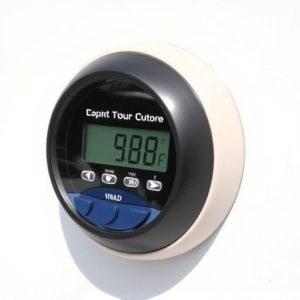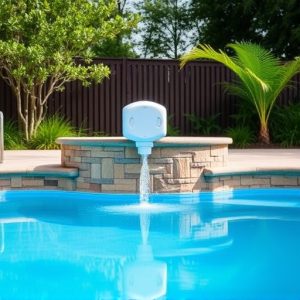Inground Pool Safety: Optimal Use of Swimming Pool Alarm Systems
Swimming pool alarms are critical for inground pool safety, offering real-time monitoring and immed…….
Swimming pool alarms are critical for inground pool safety, offering real-time monitoring and immediate alerts for unauthorized access or accidental falls. These systems detect motion on the water's surface or underwater movements through advanced technologies like sonar, ensuring they respond to genuine incidents while being resistant to common environmental disturbances. They are so effective that many regions legally require them. When selecting an alarm, consider your pool's unique features and integration with smart home technology for enhanced remote monitoring. Regular maintenance and testing are essential for the alarms' reliability and effectiveness in preventing drowning incidents. These systems complement physical barriers like fences and are a vital part of a comprehensive safety strategy for inground pools, offering peace of mind to homeowners and safeguarding the lives of children and pets.
Swimming pool alarms have become a cornerstone of safety for inground pool owners, offering a vital layer of protection against tragic accidents. This article delves into the essential role these systems play in safeguarding lives and preventing drownings. We will explore the various types of pool alarm systems tailored specifically for inground pools, their installation and maintenance needs, and the key features that distinguish effective alarms from mere novelties. By understanding how to select and maintain a swimming pool alarm system, you can ensure your pool is equipped with a reliable safety measure.
Understanding Swimming Pool Alarms: A Safety Necessity for Inground Pools
Swimming pool alarms serve as a critical layer of safety for inground pool owners, providing real-time monitoring and immediate alerting in the event of unauthorized access or accidental falls into the pool. These sophisticated systems are designed to detect motion or changes in water surface disturbances, triggering an alarm to deter potential tragedies involving children or pets. The integration of such alarms is not just a responsible measure but a mandatory safety feature in many regions due to their effectiveness in preventing drownings.
Inground pool alarms come in various forms, including surface wave detectors and underwater motion sensors. Surface wave detectors are sensitive to the unique sound waves produced by swimming or falling into the water, while underwater motion sensors use sonar technology to detect unusual movements beneath the surface. Both types of systems are designed to be highly sensitive yet immune to common environmental factors like rain, wind, or wildlife to minimize false alarms. By ensuring a prompt response to potential hazards, inground pool alarms are an indispensable component of a comprehensive safety strategy for residential pools.
Types of Pool Alarm Systems: Finding the Right Fit for Your Inground Pool
When prioritizing safety around your inground pool, investing in a reliable swimming pool alarm system is paramount. These systems are specifically designed to enhance the security measures of your aquatic space by providing real-time alerts when unauthorized or unexpected entries occur. The market offers a variety of options tailored for inground pools, from surface wave motion detectors to underwater pressure-sensitive mats. Surface wave detectors monitor the natural waves created by an individual entering the water and trigger an alarm if the frequency or magnitude deviates from normal activity. On the other hand, underwater pressure mats are installed along the pool steps or bottom and activate when weight is detected beyond what is typical for regular use.
Choosing the right swimming pool alarms for inground pools involves considering several factors, including the size and depth of your pool, as well as the frequency of its use. It’s important to select a system that aligns with your specific needs and complements your existing safety infrastructure. For instance, some systems integrate seamlessly with smart home technology, allowing for remote monitoring and instant alerts sent directly to your mobile device. Additionally, consider the ease of installation, maintenance requirements, and battery life when selecting a model. By doing so, you can ensure that the swimming pool alarm system you choose not only meets the necessary safety standards but also provides peace of mind while enhancing the overall security of your inground pool environment.
Installation and Maintenance: Ensuring Your Pool Alarm System Works Optimally
When installing swimming pool alarms for inground pools, it’s crucial to adhere to the manufacturer’s guidelines to ensure optimal performance and safety. Typically, these systems consist of a surface wave detector and a remote receiver, which should be placed according to the specifications provided. The detection unit is installed at the water’s edge and is sensitive enough to detect unauthorized access or falls into the pool. It’s important to install the system in a location where it has an unobstructed view of the pool’s surface to accurately monitor for wave disturbances caused by activity in the water. Additionally, the remote receiver should be positioned within a designated range from the detection unit to alert homeowners or lifeguards promptly upon activation.
Regular maintenance is key to maintaining the effectiveness of your inground pool alarm system. This includes periodic checks to ensure the sensors are functioning correctly and that the system components are clean and free from debris or damage. The batteries should be tested regularly, as a low battery can compromise the alarm’s performance. It’s also advisable to test the alarm monthly by creating a wave on the pool’s surface to simulate an entry into the water. Should the alarm fail to activate during these tests, it’s important to troubleshoot and address any issues immediately. Routine maintenance not only prolongs the life of your pool alarm system but also ensures the safety of swimmers by providing a reliable barrier against potential drowning incidents.
Key Features to Look for in Pool Alarms Designed for Inground Pools
When selecting a swimming pool alarm for an inground pool, safety and reliability are paramount. These alarms serve as a critical line of defense against unauthorized access, which is why features such as real-time monitoring and immediate audible alerts upon detection of any intrusion or water disturbance are essential. High-quality inground pool alarms often come with wireless connectivity, allowing for seamless integration with your existing home security system. Additionally, they should be equipped with a long-range sensor that can effectively cover the entire surface of the pool, ensuring comprehensive protection.
The best swimming pool alarms for inground pools also offer customizable sensitivity settings to adapt to different environments and usage patterns. This means you can tailor the alarm’s responsiveness to suit your family’s needs, minimizing false alarms while maintaining vigilant surveillance. Another important feature to consider is the alarm’s durability and resistance to environmental factors such as humidity and temperature changes. High-grade materials and waterproof design ensure that the alarm remains functional and reliable over time, even in the harsh conditions around an inground pool. When purchasing a swimming pool alarm, prioritize models with these robust features to safeguard your investment and protect your loved ones.
The Role of Swimming Pool Alarms in Preventing Drownings and Protecting Lives
Swimming pool alarms serve as a vital layer of safety for individuals using inground pools, acting as a deterrent to unauthorized access and a lifesaving tool against drowning incidents. These alarm systems are designed to detect motion in and around the pool area, immediately triggering an audible alert that can deter both children and pets from entering the water without supervision. The effectiveness of these alarms is heightened when they are used in conjunction with other safety measures such as physical barriers like fences and gates, ensuring a comprehensive security system for pool owners. Additionally, the integration of swimming pool alarms for inground pools within a multi-faceted drowning prevention strategy can significantly reduce the risk of tragic accidents. These systems are sensitive enough to differentiate between authorized users and intruders, providing peace of mind to homeowners with young children or pets. By ensuring timely intervention in potentially dangerous situations, swimming pool alarms for inground pools play a crucial role in safeguarding lives and preventing drownings. Regular maintenance and testing of these alarms are imperative to guarantee their functionality and reliability, making them an indispensable tool for any residential or public pool setting.


